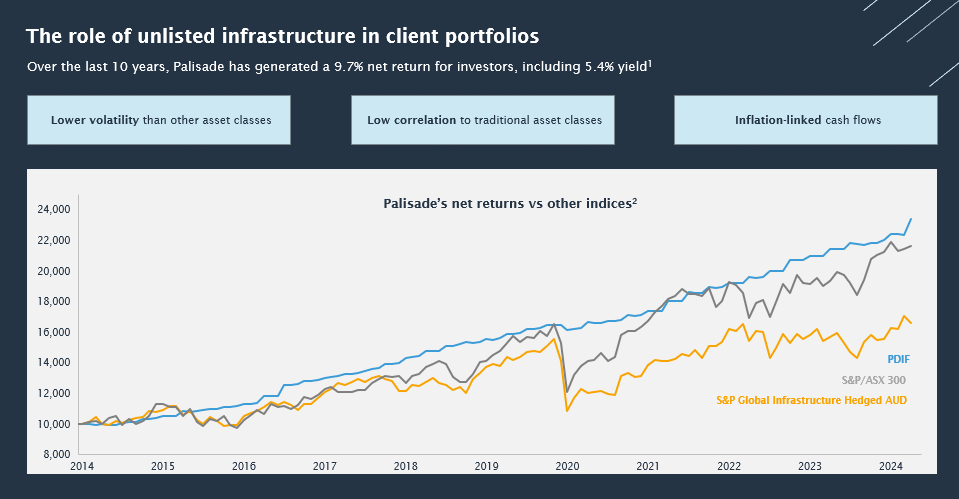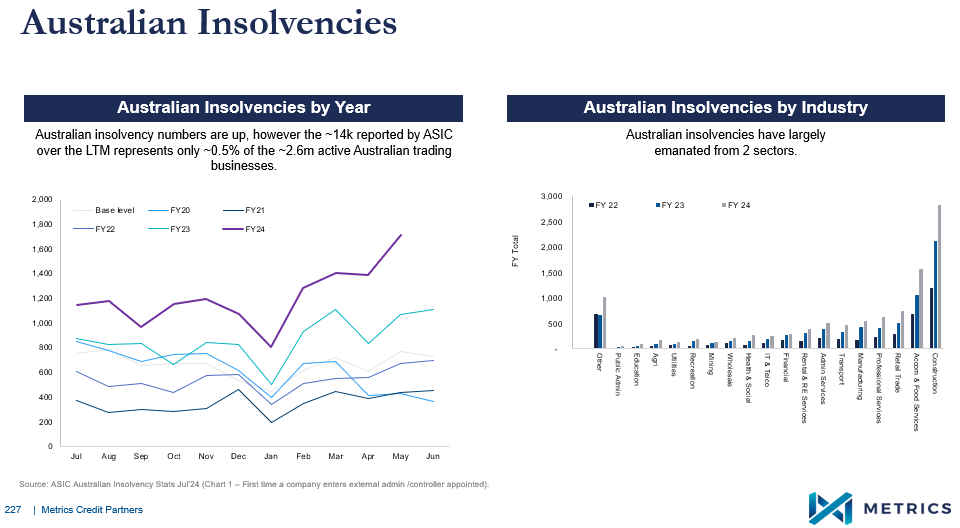Looking beyond stocks and bonds: How alternatives can help power your portfolio
Pinnacle Investment Management recently conducted its investment summit – Alpha Uncovered 2024.
Livewire has already brought you some of the key insights from the summit, across asset classes such as Australian equities and global markets.
This instalment will shine a spotlight on the alternatives space, and the managers within the Pinnacle stable that focus on this broad asset class.
Palisade Investment Partners: Why infrastructure, why now?

Vicki Rigg, Managing Director at Palisade Investment Partners, likes infrastructure for three key reasons:
“It provides us with moderate capital growth. It provides us with CPI protection. Most importantly, it provides us with really low correlation with other asset classes”, says Rigg.
She adds that it is the low volatility, low risk, and low correlation that make infrastructure so attractive — and pertinent given the recent moves in financial markets.

1. PDIF historical net returns as at 30 June 2024, including franking credits. Past performance is not a reliable indicator of future performance.
2. Source: Morningstar Direct Note: Total returns excluding franking credits per annum from 30 June 2014 to 30 June 2024, and indexed to starting investment of $10,000.
Rigg referred to the chart above in her presentation, highlighting the 9.7% per annum returns from Palisade’s flagship diversified fund over the past 10 years, with more than 5% coming in the form of yield. Those returns are compared to equities (S&P/ASX 300) and S&P Global Infrastructure Hedged AUD.
“We're very proud of the returns that we've achieved over the last 10 years, but it really is the low volatility and the low correlation that I want to highlight”, says Rigg.
Looking for adventure
Rigg is fully aware that infrastructure is often tagged as a “boring, stable asset class” but insists that Palisade invests in exciting assets “that are essential to our lives and essential to the economy”.
She cites 100% ownership of the Sunshine Coast Airport and part-ownership of the Alice Springs airport as examples, along with broader transport assets like rail, ports, assets that are essential to supply chains, and social infrastructure like hospitals and energy transition.
“All of this is essential and it's stuff that we use every day without really thinking about it”, says Rigg, adding that “it's the essential nature of infrastructure that makes cash flows more predictable”.
These businesses also happen to have high barriers to entry and long life spans—think 30, 50, even 100 years—“and they yield well throughout their lifespan,” adds Rigg.
As long as the assets are “tangible, essential, and predictable (or more predictable as compliance like me to say), they're the three words that sum up why we believe you should have infrastructure in your portfolio”.
Five V Capital: Capturing the incredible opportunity in private equity

Justin England from Five V Capital wants to keep it simple when it comes to private equity.
At its core, the opportunity set of 18,000 private companies dwarfs the approximately 2000 listed companies here in Australia. Many of those companies are not only profitable and cash-generative with lots of growth prospects, but they are in front of investors daily, “whether it's your IT services provider, the education institute you went to, the software you use to manage your team”, says England.
Below, England highlights two company stories that help illuminate the opportunity.
1. BioPak - "Gary Smith founded BioPak in Bondi. It was the first mover in sustainable packaging in Australia and New Zealand, and the business has grown exponentially.
"The company generates over $20 million of profits and cash generation; we like that dynamic. Gary's coming to us as a founder for expertise to help him expand his business. He has clearly demonstrated success in Australia and New Zealand, and we're helping him extract a lot more growth internationally. So, our benefit is we plug into Gary, he gains a lot of bandwidth in terms of our team and resources, and he can really lean into this international leg of growth.
"We're taking a position next to Gary, and we're driving meaningful impact.
"This is a clear example of the types of opportunities that are available to you, whether you're drinking coffee or having Uber Eats", says England.
2. Cyclotek - "A cyclotron is used to create a radioisotope and a radioisotope is a key component of what is used in the fastest growing type of camera used to diagnose cancer, which is called a PET scan.

"Here in Australia, there's something like 18 cyclotrons, so the good news is we've got a really thriving cancer care industry that's well invested and we're able to improve diagnosis by supplying these types of diagnosis tools.
"This is a private company based in Melbourne that owns nine of those 18 cyclotrons, generates over $15 million of profit and cash generation has existed for over 20 years. It's owned by one individual called Greg Santamaria.
"Why did Five V get involved? Greg had a partner who was looking to de-risk—at an age and stage where they wanted some liquidity in their lives to take cash off the table—and Greg wanted us to facilitate that transition.
"Another key example of a great private business. It has a reason for being, it's existed for a long time. It's got some great growth prospects as cancer care evolves.
"This is a business that 180,000 patients interact with. We manufacture 4,000 doses per week. So it's really an operation of scale and it's both in Australia and New Zealand."
"Hopefully, you can understand our passion for partnering with these founders and families and entrepreneurs, the scale of the opportunity, and the businesses hiding in front of you every day," he added.
England closes by saying that there are “plenty of those businesses out there”, which has allowed Five V Capital to grow to $5 billion in assets under management, and a team of 40 that is actively involved.
“We're only able to drive that active management through the partnership dynamic, by having a real seat at the table and assisting that founder in targeting growth,” says England.
Metrics Credit Partners – Optimising portfolios with private assets

Metrics continues to grow and scale, according to Managing Partner Andrew Lockhart, “as the banks continue to recede and concede market share”. With a team of around 150, Metrics is active across the loan market.
But Lockhart’s presentation at the Pinnacle Summit was not primarily focused on Metrics' growth. Rather, Lockhart took the opportunity to dispel four key misconceptions about private credit and explain how Metrics do things differently.
Lockhart begins by pointing out that private credit is “not a homogenous asset class” and that not “all private credit, private debt is the same”.
“The asset class is very different. At one end of the risk spectrum, you can be investing in high investment-grade loans to corporates. At the other end of the risk spectrum, you could be taking high-yielding subordinated or mezzanine debt where you're taking equity kickers”.
Below are the highlights of Lockhart’s discussion about each of the four misconceptions.
1. Explosive growth – “The first theme is around macroeconomic risk or macroeconomic drivers. Private credit is growing, so there must be something wrong is the catch cry.
"Australia does not have a large, deep-functioning bond market. Most Australian companies aren't rated by S&P or Moody's. They're heavily reliant on banks for funding. But because of the regulatory changes, the banks are continuing to withdraw capital from the market.
"What are we to do? Sit back and see a situation where Australian companies don't have access to funding. Of course, you're in a position to resolve that and support those companies with access to capital.
"Suddenly there's this massive wall of insolvencies. The chart below highlights that those insolvencies are predominantly in one sector - the construction sector. We saw construction costs rise 25 to 30% from around 2021. Those small and medium-sized companies that have assets of less than $10 million have been the area of the largest area of defaults and insolvencies.

"We're not lending to small and mid-sized companies. So I'm not really sure that's a reflection on the kinds of private credit investments that we make.
"If you look at the addressable market of where Metrics lends, we have the same exposure, same experience, that the domestic major banks have. They're not seeing significant increases in loss rates. This idea that private credit is exposing portfolios to a significant risk of loss, I think is misstated".
2. Poor or weak lending standards – "The biggest risk that an investor is exposed to in private credit is the risk of a loss of capital as a result of a default and the failure of the manager to manage and protect the investor's interests.
"There are lots of ways that are available to a private credit manager to manage credit in a default or a workout scenario that are not necessarily available in other asset classes.
"We could be quite prepared to wipe out the interests of other equity shareholders and others to protect the interests of our investors and convert that debt to equity at a later stage, i.e. consider a restructure of that asset.
"In terms of loan origination, I would argue that as a private credit manager that's investing across a whole range of industries and sectors, we have access to information well ahead of others in the market. Our clients are telling us exactly what's going on in their business every day. We're using that information to assess the ongoing risk associated with investing or providing financing to those companies.
"Through that origination process, ongoing ability to structure and negotiate appropriate terms, and then ongoing management of those loans, we are able to understand the position.
3. Weak governance, lack of openness, lack of transparency – "I can only talk about Metrics' experience. Our processes require us to be compliant with Australian continuous disclosure obligations and ASX listing rules. As a result of that, we have a responsible entity or trustee in the form of Perpetual.
"One of the ways they ensure that we are compliant with the obligations around continuous disclosure obligations is that they've appointed Ernst and Young to do a monthly valuation and impairment testing across every asset in our portfolio. If there's any deterioration in credit quality that would impact the carrying value of the fund needs to be immediately reported.
"KPMG undertake a half-yearly and an annual review process. I accept the fact that we may not be able to be transparent in relation to the holdings that we have because we're subject to confidentiality obligations between a lender and a borrower.
"But what we can explain is the process and independent assessment and overview and governance regime that we operate under to ensure that investors can be comfortable that when we quote a daily NAV, the process has rigour and it's a robust process.
"Mercer Sentinel undertakes an operational risk review on an annual basis. We're one of the only funds globally in private credit that have S&P ratings on our funds. We don't use that to raise cheap debt financing, but what we do is we can highlight the difference when a company is borrowing money from a Metrics fund, they know the credit risk that they take when they borrow from our funds".
4. Investment risks - "Obviously all investments are going to have some degree of risk. I believe that in private credit you've got a great investment asset class, a short-dated floating rate, and the ability to generate security or hold security.
"I think it's primarily an asset class for domestic purposes. I see a lot of people looking to invest in say, US or European private credit funds. The reality is most Australian private wealth clients do not need the complexity of complexity associated with tax, nor the risk associated with foreign currency to be able to gain an attractive return in private credit.
"Size and scale are very important in terms of lowering investment risks in terms of greater diversification of the portfolio. But it also means that when you are originating a transaction with a company, you are relevant to that company.
"We've now operated our first fund for over 11 years since we launched that first fund.
"Every single one of Metrics’ funds - we now operate over 21 different investment vehicles - has exceeded the minimum target return and delivered positive returns for investors month-in, month-out.
"A focus of that is around appropriate risk management, making sure that you're lending on appropriate standards and that equity wears the risk of any loss. We have workout, skillset, and capability - we're not a soft touch.
"Whenever we're negotiating a transaction, we're in there negotiating for and on behalf of our investors. What we're seeking to deliver is stability of capital and a very attractive source of income," Lockhart closed by saying.
Access more insights from the Pinnacle Investment Summit here.
4 topics
1 stock mentioned
3 funds mentioned
1 contributor mentioned

